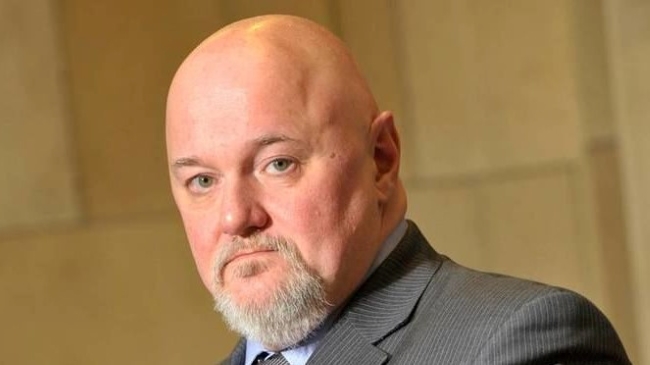Claude Moniquet, former intelligence agent at the French Directorate General for External Security addressed a webinar on October 22, 2020, over the Iranian regime’s terrorism in Europe.
Also, a group of European and US personalities, lawyers and experts joined the online event hosted by the National Council of Resistance of Iran (NCRI) on October 22. They condemned the Mullahs’ regime’s terrorism campaign in the Europe and called on the EU to pursue a firm policy against the Iran’s regime.
Participants condemned the regime’s support for terrorism around the world and called on the EU to end the appeasement policy under the pretext of engagement with the mullahs. It is time to make it clear to the mullahs’ regime that their support for terrorism in Europe soil and across the world will not be tolerated.
Mrs. Maryam Rajavi, the President-elect of the National Council of Resistance of Iran(NCRI), was the keynote speaker at this event. Her message welcomed as a democratic solution to Iran’s future.
Claude Moniquet, former intelligence agent at the French Directorate General for External Security
Thank you. I’m dealing with intelligence and security matters for the last 40 years, especially in dealing with Iranian terrorism and Iranian intelligence since ’87. It was just after the Iranian attack in Paris in ’85-’86, and the so-called Lebanon hostage crisis. So, I think I’m a bit familiar with the way Iran and Tehran using terrorism as a political tool.
William Bourdon said at the very beginning of this press conference, that this will be an unprecedented trial and it is very clear it will be, because it will be the first time we have an official Iranian diplomat in the box on the trail. And this will underline something which is extremely important and which was not really understood in Europe, especially in Brussels, in Paris for the last decades.
Terror when it comes to Iran, it’s not an accident. Terror is just the political tool the mullah regime could decide to use at one moment, where it is confronted, to try to advocate its interest and it goes. The Iranian regime has a few possibilities. They could use normal diplomatic operations, they could use commercial relations, they could use, of course, intelligence, as other states do, but they could also use terror. And when they decide to do this, it is not decided just by one man somewhere in Tehran. It’s the whole regime which decided, because everything is the founding of the Supreme National Security Concern, the SNSC.
And inside the SNSC, you will find all the representatives of all the most important centers of power in Iran. You will find, of course, representative of the President of the Republic, of the supreme guide, but you will also find the Speaker of the Parliament, we’ll find the chief justice, we’ll find the chief of general staff, the chief of the army, the Revolutionary guards and so on. So, it is very clear that all those people, they have…, all those people when it comes to using terror as a political tool, our concern, because they’re taking the decision to do so.
It was said by the Iranian that the first defense was that everything was Zionists or a Western plot, and this terror attack was a fake and was never a real terrorist attack. The second line of defense of the regime was to say that Assadi, the most important defendant, was a rogue element, someone acting on his own. It must be very clear that something like a rogue element doesn’t exist in the Iranian regime. When it comes to intelligence, when it comes to terror, when it comes to terrorist things and terrorist concern, there is no independence of people and there is no rogue element able to decide on their own that they will conduct a terrorist operation in Paris or in London, or in Indiana.
I would like to add a few words, to answer a question which was asked a few minutes ago. What can we wait if Assadi is convicted? Very clearly, and all the stories of Iran in the last 40 decades goes in the same direction. Very clearly, we can wait a civil terrorist operation, not only against divergent interests, but probably against the European interest, maybe against France, maybe against Germany, and so on. We know, for instance, that the regime tried to exert considerably and it didn’t try, actually it exerted considerable pressure on the French government to push the government to ask the Belgian authorities not to prosecute Assadi.
So, as France’s faith in what was requested by the regime, France could be a target for the Iranian terrorists, and not only on the French side, but also of course, in the Middle East, in Africa, in South America. This is the nature of the regime. And most of all, it is also a pure product of weakness, I mean the European weakness. Since the 1980s and the 1990s, the mullah regime has conducted numerous terrorist operations against European interests, both in Europe, in Vienna, in Paris, in Berlin, in other places, and in other parts of the world.
So, clearly, there was no real answer to the European answer to those terrorist threats and those terrorist actions. And Tehran understood that it was possible to threaten and even to attack Europe without having any price to pay. All the opposite, those attacks benefited Iran, which got exactly each time what it was looking for. So, I think clearly, that the only question today is, what European Union shall do and what European Union will do after the trial if Assadi is convinced? Meaning that behind Assadi, of course, it will be all the regime and all the global amounts, which must be taken accountable for this terrorist action. I thank you.
